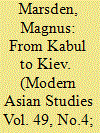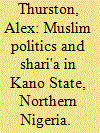| Srl | Item |
| 1 |
ID:
140291


|
|
|
|
|
| Summary/Abstract |
While the territory of Afghanistan is widely connected in the popular and historical imagination to long-distance trade, Afghan society continues to be popularly represented as being made-up of ‘tribes’, who subscribe to static ‘honour codes’, and tenaciously cling to archaic tribal values. This article examines the significance of traders of Afghan background to commodity flows across a wide range of contexts in the former Soviet Union, especially in Russia and Ukraine and the Muslim-majority Central Asian Republics. It charts the social and political backgrounds of the merchants who make up this trading network, the nature of their connections to one another and the forms of mobility that make these connections possible, their complex relations with the communities amongst whom they live, and the types of moral value they attach to their work as traders.
|
|
|
|
|
|
|
|
|
|
|
|
|
|
|
|
| 2 |
ID:
137754


|
|
|
|
|
| Summary/Abstract |
Since 1999, Muslim-majority northern Nigeria has witnessed a new phase of political struggles over the place of Islamic law (shari'a) in public life. This article traces how Muslim politics played into shari'a administration in Kano, northern Nigeria's most populous state, and argues that governmental bureaucracies created for the purpose of administering shari'a became sites of political contests over the meaning of public morality in Islamic terms. Shari'a bureaucracies featured as prizes in unstable political alliances between Muslim scholars and elected Muslim politicians. Politicians' appointments of Muslim scholars to bureaucratic positions, and their empowerment or disempowerment of certain bureaucracies, posed fundamental questions concerning who would control the shari'a project and what its content would be. The manoeuvres surrounding Kano's shari'a bureaucracies reflect broader trends in northern Nigerian politics. The shari'a project has not been a manifestation of Islamism in a narrow sense, but rather the site of a more complex set of intra-Muslim rivalries and electoral competition within an ostensibly secular political system.
|
|
|
|
|
|
|
|
|
|
|
|
|
|
|
|